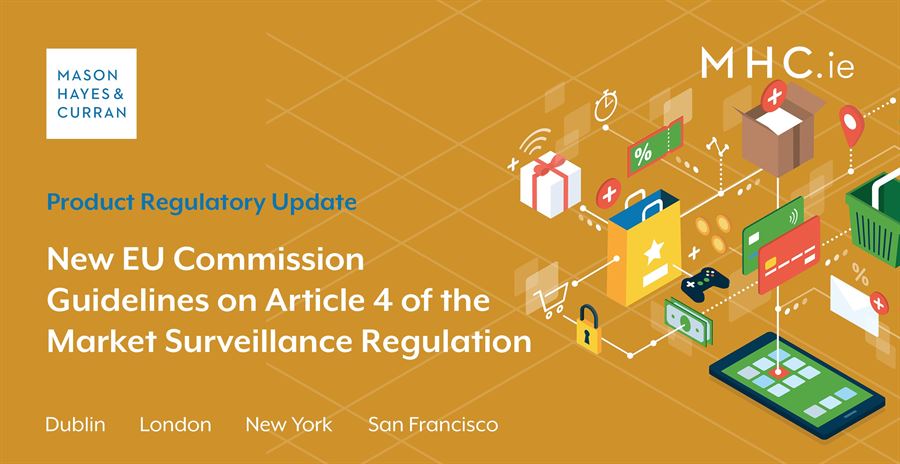New EU Commission Guidelines on Article 4 of the Market Surveillance Regulation

The European Commission has recently published its Guidelines for economic operators and market surveillance authorities on the practical implementation of Article 4 of the new Market Surveillance Regulation (MSR). The MSR will come into full force on 16 July 2021. It applies to products that are subject to a wide list of EU product legislation specified in Annex I, save where that legislation contains more specific, equivalent provisions regulating market surveillance and enforcement.
Article 4 MSR requires specific products to have an EU-based economic operator before those products can be placed on the EU market. For more information on the MSR or the requirements under Article 4, please see our articles from July 2020 and March 2021.
Scope of Article 4 MSR
As emphasised in the Commission Guidelines, it is important to note that Article 4 will only apply when a product:
-
Is subject to one or more of the specific EU Directives or Regulations listed in Article 4(5) or other legislation that makes explicit reference to Article 4. This includes, for example, construction products, PPE, appliances burning gaseous fuel, machinery, toys and electronic and electrical equipment, and
-
Is placed on the EU market – i.e., made available for the first time on the EU market – on or after 16 July 2021. “Making available on the market” means being supplied for distribution, consumption or use on the EU market in the course of a commercial activity, whether in return for payment or free of charge. In addition, the MSR provides that products offered for sale online, or through other means of distance sale, are considered to be made available on the market if the offer is targeted at end-users in the EU.
For the purposes of Article 4 MSR, an “economic operator” can be one of the following:
-
The manufacturer
-
The importer, in instances where the manufacturer is not established in the EU
-
An authorised representative who has a written mandate from the manufacturer; or
-
A fulfilment service provider, where none of the above are established in the EU. This is a person or company offering at least two of the following services commercially: warehousing, packaging, addressing and dispatching, without having ownership of the products involved. However, postal and parcel delivery companies are specifically excluded.
Notably, the definition of economic operator under Article 4 is slightly narrower than the general definition of “economic operator” set out in Article 1(13) MSR. Article 1(13) MSR defines an “economic operator” broadly to mean “the manufacturer, the authorised representative, the importer, the distributor, the fulfilment service provider or any other natural or legal person who is subject to obligations in relation to the manufacture of products, making them available on the market or putting them into service in accordance with the relevant Union harmonisation legislation”. This wider definition should, therefore, capture all entities in the supply chain for products subject to the MSR, and not only those to which Article 4 applies.
The Guidelines
The Guidelines provide helpful insight into a number of areas relating to Article 4 MSR. These include:
Identifying the economic operator
The Guidelines state that the identity of the economic operator depends on the supply chain, and provides a helpful flowchart to use as a step-by-step guide.
Products sold through online marketplaces
The Guidelines offer some much-welcomed clarity on products sold through online marketplaces. It provides that:
-
Article 4 MSR applies to products sold through online marketplaces
-
There is no specific obligation on the online marketplaces where they are merely providing intermediary services to third-party sellers to monitor the activities on their platform for any illegal activity, including their sellers contravening Article 4 MSR. They merely have to “act expeditiously to remove or to disable access to the illegal content in question” where they “obtain actual knowledge or awareness” of such content. However, where an online marketplace is also a manufacturer, importer, authorised representative or fulfilment service provider, it could be the economic operator for the purposes of Article 4 of the MSR
Tasks of Article 4 economic operators
The Guidelines break down and explain the various tasks of the economic operator in Article 4(3) MSR. These include verifying and ensuring availability of the declaration of conformity and technical documentation when they take up their duties. They are also required to, when a new product is added to their portfolio, inform authorities when they believe a product presents a risk. They must also ensure that necessary corrective action is taken immediately to eliminate or mitigate that risk. Finally they must cooperate with the authorities, including providing relevant documentation on request.
In this regard, the Guidelines further provide that:
-
An economic operator should act within a reasonable timeframe or within any deadline set by the market surveillance authorities (MSA).
-
If the economic operator finds that it cannot fulfil one or more of its tasks due to a problem in its relations with the manufacturer, e.g. the manufacturer does not respond to a request, an appropriate follow-up would be to remind the manufacturer of its obligations under EU legislation. If the problem persists, the logical consequence could be for it to take the necessary measures to cease being the economic operator for the products in question, on the basis that it is unable to carry out its tasks under Article 4.
-
The economic operator can be sanctioned if it does not fulfil its tasks under Article 4. Member States are required to lay down rules on penalties (Article 41(1) MSR). Any penalties must be effective, proportionate and dissuasive.
-
The manufacturer remains responsible for the compliance of the product with sector-specific legislation and (like other actors in the supply chain) retains any legal obligations it has as regards products, guarantees, liability for defective products, and so on.
Article 4 does not impose additional legal obligations on economic operators vis-à-vis consumers or other end-users.
Interactions with other sector-specific legislation
The Guidelines point out that the tasks of the economic operator under Article 4 are the same regardless of the type of economic operator. However, the extent to which they overlap with the economic operator’s other tasks under sector-specific legislation differs. It states that, while there are some sectoral differences, most sector-specific legislation already closely follows the model of economic operator obligations contained in Article 4 of the MSR. Indeed, it notes that, as a general rule, responsibilities under sector-specific legislation overlap with, and go beyond, the obligations under Article 4(3) MSR.
The Guidelines refer to certain exceptions to this general rule, however. For instance, the EU legislation on outdoor noise, machinery and eco-design does not explicitly require manufacturers or importers to inform MSAs where they have reason to believe that a product covered by such legislation presents a risk. Manufacturers/importers established in the EU who are the economic operator referred to in Article 4 will, however, have to do this for the products covered by this legislation.
Checks by market surveillance authorities
MSAs, in performing appropriate checks, have to follow a risk-based approach designed to achieve the greatest impact on the market. Article 4 economic operators are required to help MSAs obtain compliance documents. MSAs can contact the economic operator referred to in Article 4 directly even if it is located in another Member State. The Guidance requires MSAs to be specific about the type of documents they need and the products for which they need them.
Interestingly, the Guidelines provide that MSAs can contact the economic operator referred to in Article 4 on an issue that is relevant to the manufacturer whose product(s) it deals with, but that does not specifically fall within the scope of Article 4, i.e. an issue that concerns legislation or products not covered by Article 4. Although Article 4 does not specifically provide for such requests, the economic operator referred to in Article 4 is encouraged to facilitate contacts between the authorities and manufacturers for these purposes.
Controls on products entering the EU market
The Guidelines state that where border authorities find that the name and contact details of the Article 4 economic operator are not indicated on the product, the packaging, the parcel or any accompanying document, or where they have cause to believe that the product does not comply with Article 4 for other reasons, the border authorities should:
-
Suspend the release of the product for free circulation
-
Notify the MSAs, and
-
Await the MSA’s reaction
Non-compliance with Article 4
Finally, the Guidelines also refer to the enforcement of Article 4 requirements.
Where MSAs find, in the course of their investigations, that the name and contact details of the economic operator referred to in Article 4 are missing or are false, they should require the relevant economic operator to take corrective action. They also have the power to impose penalties. As mentioned above, economic operators themselves can be sanctioned if they do not comply with their obligations (including the requirement to cooperate with MSAs).
Conclusion
The Guidelines provide some much welcome clarity on the practical workings of Article 4 MSR. They explain in greater detail the various tasks of the economic operator in Article 4(3) MSR; discuss how the obligations under Article 4 interact with similar obligations contained in sector-specific legislation; and provide clarity on products sold online, MSA checks and controls on imported products.
For more information and expert advise on marketing your products, contact a member of our Product Regulatory & Consumer Law team.
The content of this article is provided for information purposes only and does not constitute legal or other advice.
Share this:




